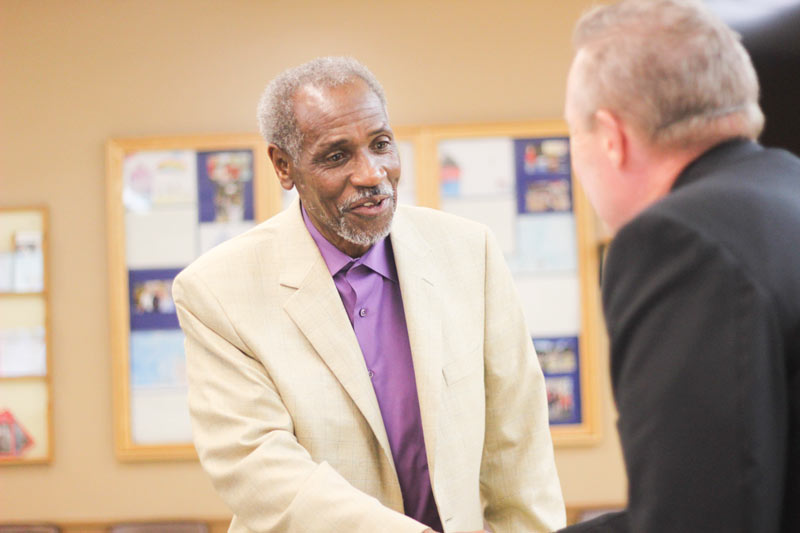
COLUMBIA—Understanding often starts with a simple conversation. That was the reason Bishop Robert E. Guglielmone and other Catholic clergy met with members of the Muslim community on April 5 at St. John Neumann Church.
The gathering was organized by Father Sandy McDonald, vicar for ecumenical and inter-religious affairs for the diocese. He said the goal was to begin a dialogue between the two groups to better understand their faiths and the issues facing both communities.
The meeting was also attended by Msgr. Richard D. Harris, vicar general for the diocese; Msgr. Ronald Cellini, pastor of St. Gregory the Great Church in Bluffton, and Redemptorist Father Peter Sousa, pastor of Our Lady of the Hills Church in Columbia.
The Muslim community was represented by Imam Omar Shaheed, leader of Masjid as-Salaam on Monticello Road in Columbia, and Akif Aydin of Greenville, a native of Turkey and South Carolina representative of the Atlantic Institute, an organization dedicated to promoting intercultural understanding.
Bishop Guglielmone and the priests heard a brief overview about the Muslim population in South Carolina and the cultural backgrounds of those in the Midlands.
The clergy talked about the history of the Catholic Church in South Carolina and reflected on the fact that Roman Catholics went through prejudice for generations during their early history in the United States.

They asked the two Muslim leaders if members of their religion had experienced prejudice in the years since Sept. 11 and in recent months after deadly attacks by Islamic extremists in Europe.
Imam Shaheed said his mosque in Columbia has worked hard to develop a presence in the community, including hosting social gatherings and providing meals for the needy, and that so far none of his members have reported overt prejudice.
Aydin said he knew of several people, including his wife, who had negative experiences. He said his wife, who wears the traditional Muslim head covering for women known as the hijab, received some harsh comments while out shopping and once had a passing driver tell her to “Go home to your country.”
“There are prejudices out there and it has become more of a concern with things that have happened recently and some of the rhetoric that has come out during the presidential campaign,” he said.
Both Imam Shaheed and Aydin said people need to make more of an effort to be active in their communities and do more outreach to foster understanding of different faiths.
“The common Muslim identity has been hijacked by the extremists,” Aydin said. “We are dealing with having to find ways to show we are a Muslim but also that we are part of this country, that we are not those people overseas who are causing the violence. Bad things in the news and negative attitudes can be traumatizing to our young people. They know what is going on, they feel it in the air. The challenge we have is how do we get observed and regarded as members of the community? How do we get recognized by people as their neighbors?”
The discussion ended with both groups agreeing that they need to increase outreach to each other. Aydin said he hopes that Christians and Muslims can find common ground in the fact that they all believe in God and value faith in a time when secularism is on the rise.
Photos by Christina Lee Knauss/Miscellany: Top photo: Imam Omar Shaheed (left), greets Msgr. Richard D. Harris, vicar general of the Diocese of Charleston

